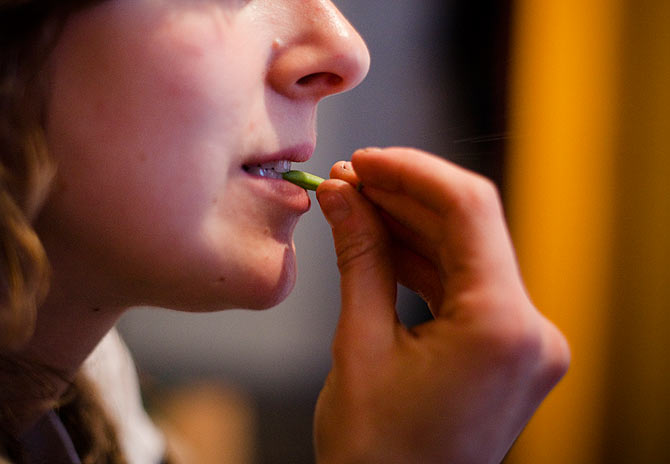Photographs: Rebecca Brown/Creative Commons ANI
Here's a round-up of the latest findings across an array of pressing health issues.
Did you know persistent coughs could be a sign of lung cancer? Or that sex can actually help you live longer? Read on to learn more.
Lung cancer warning: Don’t ignore persistent coughs
An expert has claimed that unexplained coughs and chest infections should be taken seriously as they could be a sign of lung cancer.
According to cancer Australia CEO Professor Helen Zorbas, anyone with a cough that has lasted for three weeks or more should see a doctor, News.com.au reported.
Other signs include a changed cough, coughing up blood or a chest infection that won’t go away.
High cholesterol 'fuels' breast cancer
Researchers have suggested that breast cancer growth can be fuelled by high cholesterol, as a by-product of cholesterol functions like the hormone estrogen to enhance the growth and spread of the disease.
The researchers at the Duke Cancer Institute also found that anti-cholesterol drugs such as statins appear to diminish the effect of this estrogen-like molecule.
By using mouse models and tumour cells, the researchers have for the first time explained the link between high cholesterol and breast cancer, especially in post-menopausal women, and the study suggested that dietary changes or therapies to reduce cholesterol may also offer a simple, accessible way to reduce breast cancer risk.
Senior author Donald McDonnell, Ph.D., chair of the Department of Pharmacology and Cancer Biology at Duke, said they have found a molecule- not cholesterol itself, but an abundant metabolite of cholesterol- called 27HC that mimics the hormone estrogen and can independently drive the growth of breast cancer.
Using mouse models that are highly predictive of what occurs in humans, McDonnell and colleagues demonstrated the direct involvement of 27HC in breast tumour growth, as well as the aggressiveness of the cancer to spread to other organs.
They also noted that the activity of this cholesterol metabolite was inhibited when the animals were treated with antiestrogens or when supplementation of 27HC was stopped.
McDonnell said the findings suggested there may be a simple way to reduce the risk of breast cancer by keeping cholesterol in check, either with statins or a healthy diet.
Additionally, for women who have breast cancer and high cholesterol, taking statins may delay or prevent resistance to endocrine therapies such as tamoxifen or aromatase inhibitors.
The study is published in the journal Science.
Morning-after pill ineffective for overweight women
Photographs: Brendan McDermid/Reuters
A French contraceptive firm, HRS Pharma, has claimed that its morning-after pill does not work for women weighing 80 kg and above. The company made the revelation after findings of a study of levonorgestrel, a key ingredient in its Norlevo emergency contraceptive, were published, the Guardian reported.
However, Anna Glasier, a lead author of the study, said that the research wasn’t particularly aimed at studying the effect of weight on emergency contraception and merely included about 1,700 women. But, the French contraceptive maker has decided to issue a warning related to the drug’s inefficiency in overweight women along with the packaging.
A spokeswoman for UK’s Faculty of Sexual and Reproductive Healthcare said that in overweight and obese ladies the drug probably gets absorbed into their fat more quickly and doesn’t have enough time to delay ovulation.
New bra will tell you if you are overeating
Photographs: Ben Nelms/Reuters
Scientists have developed a new stress busting bra that can help people monitor their comfort eating habit, keeping in mind the fact that people tend to eat more when they are stressed.
According to Discovery News, researchers at Microsoft Research designed the bra in such way that will keep a watch on wearers’ mood and let them know when they are overeating. The sensor pads, which are created with a microprocessor powered by a 3.7-volt battery, are able to sample up to eight bio-signal channels at once.
The sensors record heart rate and respiration with an EKG sensor, skin conductance with an electrodermal activity sensor, and movement with an accelerometer.
Mary Czerwinski, senior researcher in visualization and interaction at Microsoft, said that it’s mostly women who are emotional overeaters, and the bra is perfect for measuring EKG.
Sex helps you live longer, improves health
Photographs: John Kolesidis/Reuters
A new study has revealed that sex can be one of the secrets to good health, youth and a longer life.
The research, which was conducted on fruit flies, found that male fruit flies that perceived sexual pheromones of their female counterparts- without the opportunity to mate- experienced rapid decreases in fat stores, resistance to starvation and more stress. The sexually frustrated flies lived shorter lives.
Mating, on the other hand, partially reversed the negative effects on health and aging.
Senior author Scott D. Pletcher, Ph.D, professor in the Department of Molecular and Integrative Physiology at the U-MMedicalSchool, said that the findings gave them a better understanding about how sensory perception and physiological state are integrated in the brain to affect long-term health and lifespan.
“The cutting-edge genetics and neurobiology used in this research suggests to us that for fruit flies at least, it may not be a myth that sexual frustration is a health issue. Expecting sex without any sexual reward was detrimental to their health and cut their lives short.”
U-M scientists used sensory manipulations to give the common male fruit fly, Drosophila melanogaster, the perception that they were in a sexually rich environment by exposing them to genetically engineered males that produced female pheromones.
They were also able to manipulate the specific neurons responsible for pheromone perception as well as parts of the brain linked to sexual reward.
Pletcher said that these data may provide the first direct evidence that aging and physiology are influenced by how the brain processes expectations and rewards. In this case, sexual rewards specifically promoted healthy aging.
The study was published in the journal Science.
Secrets behind 80:10:10 diet revealed
A leading health practitioner, Michele Wolff, has broken down the 80:10:10 diet for people who would like to try it.
Wolff explained that the Dr Douglas Graham-developed diet is a low-fat vegan diet, where a person eats 80 percent raw fruits and vegetables, 10 percent protein and 10 percent fat, News.com.au reported.
While creating the diet, Graham believed that 80:10:10 is the ideal ratio of nutrients to support health. To follow the diet, one must eat 80 per cent raw food like fruits, greens, nuts, seeds and avocadoes as it can be eaten and broken down easily, while providing important digestive enzymes and nutrients.
However, the biggest downside of the diet is that not every one can eat and digest raw food, and one has to be well organised, prepared and motivated to get through with the diet.







Comment
article